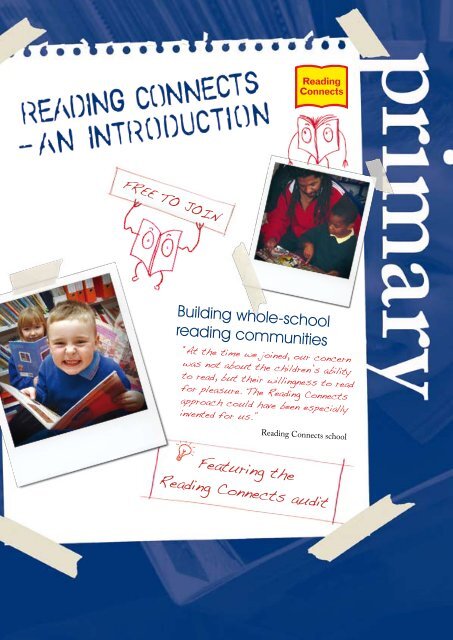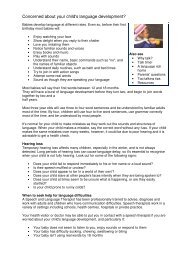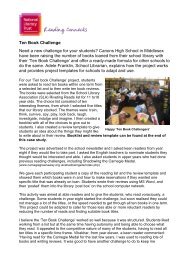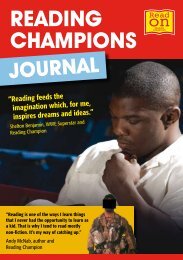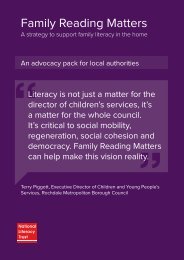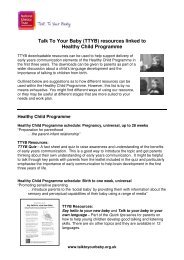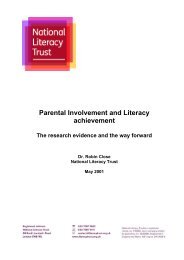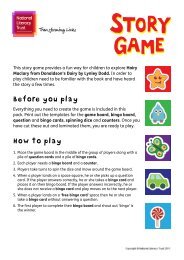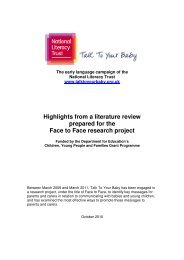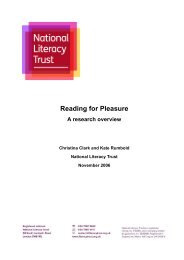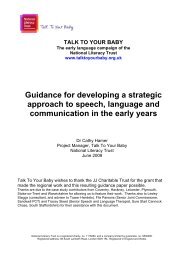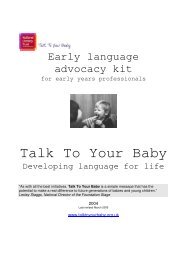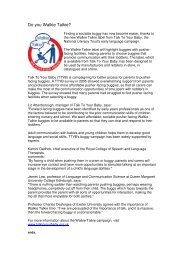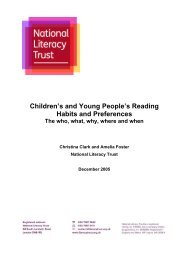Building whole-school reading communities - National Literacy Trust
Building whole-school reading communities - National Literacy Trust
Building whole-school reading communities - National Literacy Trust
You also want an ePaper? Increase the reach of your titles
YUMPU automatically turns print PDFs into web optimized ePapers that Google loves.
FREE TO JOIN<br />
<strong>Building</strong> <strong>whole</strong>-<strong>school</strong><br />
<strong>reading</strong> <strong>communities</strong><br />
“At the time we joined, our concern<br />
was not about the children’s ability<br />
to read, but their willingness to read<br />
for pleasure. The Reading Connects<br />
approach could have been especially<br />
invented for us.”<br />
Reading Connects <strong>school</strong><br />
Featuring the<br />
Reading Connects audit
2<br />
Imagine the<br />
difference it would<br />
make if every child<br />
loved to read…<br />
“…finding ways to engage students in<br />
<strong>reading</strong> may be one of the most effective<br />
ways to leverage social change.”<br />
This is the conclusion of a compelling report,<br />
Reading for Change, based on the findings of the<br />
Organisation for Economic Cooperation and<br />
Development’s Programme for International<br />
Student Assessment (OECD, 2002). Such<br />
powerful evidence brings great responsibility<br />
for all those working with children in<br />
<strong>school</strong>s today. Schools and families are key<br />
in encouraging children to develop a love of<br />
<strong>reading</strong>. Placing <strong>reading</strong> for pleasure at the<br />
centre of a <strong>school</strong>’s ethos and working with<br />
pupils’ families to encourage <strong>reading</strong> in the<br />
home must be a priority if we are to help<br />
children fulfil their potential.<br />
This booklet was written<br />
by Sarah Osborne and<br />
Julia Strong.<br />
Many thanks to Sue<br />
Sharpe, primary education<br />
consultant, for her<br />
invaluable contribution<br />
to the audit.<br />
www.<strong>reading</strong>connects.org.uk
What is Reading Connects?<br />
Reading Connects, a DCSF-funded initiative<br />
delivered by the <strong>National</strong> <strong>Literacy</strong> <strong>Trust</strong>,<br />
supports <strong>school</strong>s in developing their<br />
own <strong>whole</strong>-<strong>school</strong> <strong>reading</strong> culture.<br />
Reading Connects is more of an ethos<br />
than a project. It encourages <strong>school</strong>s to<br />
embed a holistic creative approach to<br />
promoting <strong>reading</strong> for pleasure into their<br />
policies, vision and practice, integrating the<br />
following elements:<br />
• positioning <strong>reading</strong> for pleasure at the heart of<br />
the <strong>school</strong>’s policy to raise standards and promote<br />
enjoyment in learning<br />
• involving all members of staff, including catering<br />
staff, the caretaker, governors and parent groups in<br />
promoting <strong>reading</strong><br />
• working in partnership with pupils’ families to<br />
encourage <strong>reading</strong> in the home<br />
• linking up with the local community and other <strong>school</strong>s<br />
to develop a local coordinated approach to promoting<br />
<strong>reading</strong> for pleasure<br />
• making <strong>reading</strong> as visible as possible within the <strong>school</strong><br />
environment<br />
• learning from and sharing good practice with<br />
the Reading Connects network of <strong>school</strong>s<br />
and organisations<br />
On signing up, Reading Connects<br />
<strong>school</strong>s receive:<br />
• the primary handbook<br />
• the family involvement toolkit<br />
• a certificate<br />
• access to the Reading Connects logo<br />
• the opportunity to become part of the Reading Connects<br />
network and create their own blog<br />
• ongoing support and email newsletters<br />
How do I join<br />
Reading Connects?<br />
3<br />
Visit www.<strong>reading</strong>connects.org.uk and click on ‘join Reading Connects’ in the lefthand<br />
menu. Locate your local authority and fill in the short form. The final stage<br />
of the form asks you to indicate two flexible action points, which you can always<br />
change at a later date. These can be decided upon by completing the audit on pages<br />
6-9 of this booklet, or independently as part of your <strong>school</strong> improvement plan.<br />
How can I support<br />
Reading Connects<br />
<strong>school</strong>s in my local<br />
authority?<br />
Local authorities and School Library<br />
Services can sign up as Reading<br />
Connects partners. Visit www.<br />
<strong>reading</strong>connects.org.uk and click on<br />
‘local authority partners’ to find<br />
out how you can encourage <strong>school</strong>s<br />
in your area to build <strong>whole</strong>-<strong>school</strong><br />
<strong>reading</strong> <strong>communities</strong>.
4<br />
How do I run<br />
Reading Connects in<br />
my <strong>school</strong>?<br />
Once you have signed up to Reading Connects, it is up to you how you develop<br />
your <strong>reading</strong> culture. We have no special requirements or criteria for you to fulfil,<br />
but can offer tools and support as you progress. All we ask is that you share your<br />
ideas and good practice with us so that <strong>school</strong>s can continue to learn from each<br />
other’s experiences.<br />
A number of <strong>school</strong>s have found the following suggestions useful:<br />
1. Form a small focus group of about four to<br />
five staff members (this will vary according to<br />
the size of your <strong>school</strong>)<br />
Be sure to include real enthusiasts in your group, who<br />
will run with the idea of embedding <strong>reading</strong> for pleasure<br />
across the <strong>whole</strong> <strong>school</strong> community. Make sure that there<br />
is at least one member of senior management (if possible<br />
the headteacher) in your team, as this will be vital in<br />
overcoming potential barriers.<br />
2. Complete the Reading Connects audit<br />
The self-evaluation framework on pages 6-9 of this<br />
booklet will allow your focus group to look at the <strong>school</strong>’s<br />
current <strong>reading</strong> for pleasure provision and see which areas<br />
need developing.<br />
3. Get the rest of the staff on board<br />
A <strong>whole</strong>-<strong>school</strong> commitment to moving forward with<br />
the Reading Connects approach will be essential. If you<br />
are looking for recruitment tools to use for staff meetings,<br />
Inset etc, there are numerous Reading Connects resources<br />
on the website to help.<br />
4. Make <strong>reading</strong> for pleasure as visible as<br />
possible in <strong>school</strong><br />
The Reading Connects website includes some great ideas<br />
for raising the profile of <strong>reading</strong> in your <strong>school</strong>. As well<br />
as the <strong>school</strong> corridors, classrooms and foyer, it is also a<br />
good idea to make <strong>reading</strong> for pleasure visible in places<br />
where pupils might not expect to see <strong>reading</strong> promotions<br />
– the playground or the dining hall, for example.<br />
5. Focus on further areas to strengthen your activity<br />
When you are happy with the visual profile that <strong>reading</strong><br />
for pleasure has in your <strong>school</strong>, you may like to think<br />
about focusing on further areas identified in the audit.<br />
Certainly, engaging pupils’ families in promoting <strong>reading</strong><br />
in the home will be an important area to consider.<br />
6. Explore the Reading Connects network in<br />
your area<br />
Search for your local authority on the website and identify<br />
which <strong>school</strong>s have also signed up to the initiative and<br />
which members of the local authority team have signed<br />
up as Reading Connects partners. Schools and local<br />
authority teams are encouraged to use this area of the<br />
website to build effective learning <strong>communities</strong>.<br />
7. Share your good practice with us<br />
We are always really keen to hear about your experiences<br />
of developing a <strong>reading</strong> for pleasure culture, so that we<br />
can share your good practice and experiences with other<br />
<strong>school</strong>s and authorities. Showcase your <strong>reading</strong> activity by<br />
using your <strong>school</strong>’s Reading Connects blog. Alternatively,<br />
you can email case studies to<br />
<strong>reading</strong>connects@literacytrust.org.uk.<br />
The Reading Connects audit on<br />
pages 6-9 of this booklet is optional<br />
and can be completed before or after<br />
signing up.<br />
The audit has been designed to<br />
encourage you to review the provision<br />
for promoting <strong>reading</strong> for pleasure<br />
across the <strong>whole</strong> <strong>school</strong> community.<br />
It can also be downloaded from<br />
www.<strong>reading</strong>connects.org.uk<br />
www.<strong>reading</strong>connects.org.uk
The Reading Connects website<br />
5<br />
www.<strong>reading</strong>connects.org.uk can be<br />
accessed by everyone and is a free<br />
information portal for <strong>school</strong>s and<br />
organisations looking for inspiration on<br />
how to develop a <strong>whole</strong>-<strong>school</strong> <strong>reading</strong><br />
culture. The website features:<br />
• tried-and-tested practical ideas<br />
• Reading Connects resources and links to<br />
<strong>reading</strong> resources from other organisations<br />
• the Reading Connects audit<br />
• advice on how to run Reading Connects in a<br />
<strong>school</strong>, including funding advice<br />
• inspiring case studies<br />
• access to your local Reading Connects<br />
community<br />
Have you visited<br />
www.<strong>reading</strong>connects.org.uk<br />
lately?<br />
“I was very impressed with the<br />
resources offered on the Reading<br />
Connects website and would urge<br />
every <strong>school</strong> to register. I can<br />
only say to those who work<br />
with children of any age and<br />
want to encourage the love<br />
of books, log on to the site and get<br />
searching. The ideas and help are<br />
there, so use them.”<br />
Reading Connects <strong>school</strong>
6<br />
Reading Connects primary audit<br />
This audit, on pages 6-9, is a useful tool for <strong>school</strong>s to review their current <strong>reading</strong> for pleasure provision. It<br />
provides an overview of the areas where they have developed a strong <strong>reading</strong> culture and also those<br />
where there is room for more focus. Schools may like to revisit this audit at a later date to see where they<br />
have made progress.<br />
Area of focus Developing Establishing Enhancing<br />
Whole-<strong>school</strong> vision, policy and strategy<br />
Whole-<strong>school</strong><br />
strategy<br />
Whole-staff<br />
engagement<br />
Continuing<br />
professional<br />
development<br />
Promoting <strong>reading</strong> for<br />
pleasure is part of the <strong>school</strong><br />
improvement plan (SIP).<br />
One staff member leads on<br />
this and all staff are aware of<br />
this priority.<br />
All teaching staff actively<br />
promote <strong>reading</strong> in and out<br />
of lesson time.<br />
Staff member in charge of<br />
the library has opportunities<br />
to attend training on<br />
<strong>reading</strong> issues.<br />
Promoting <strong>reading</strong> for<br />
pleasure is an ongoing part<br />
of the <strong>school</strong> strategy to raise<br />
standards and is an important<br />
part of the SIP. Staff are<br />
involved in delivering this<br />
strategy.<br />
Reading advocacy uses staff<br />
members as role models.<br />
Adult/children’s book<br />
recommendations have a<br />
regular slot in staff briefings.<br />
Promoting <strong>reading</strong> for<br />
pleasure is central to the<br />
<strong>school</strong>’s policy to achieve and<br />
enjoy. It forms an important<br />
foundation for improvement<br />
within the SIP.<br />
Reading celebration and<br />
advocacy involves all groups<br />
of the wider <strong>school</strong><br />
community, including catering<br />
staff, caretakers, governors<br />
and parent groups.<br />
Providing ideas for promoting<br />
<strong>reading</strong> is integrated into the<br />
<strong>school</strong>’s Inset programme.<br />
Crosscurricular<br />
links<br />
Subject leaders compile<br />
topic booklists and teachers<br />
use some class time to<br />
promote <strong>reading</strong> related to<br />
curriculum areas.<br />
Use of library for wider<br />
<strong>reading</strong> and research around<br />
topic areas is integrated<br />
into schemes of work across<br />
curriculum areas.<br />
Curriculum delivery<br />
integrates developing <strong>reading</strong><br />
independence and promoting<br />
<strong>reading</strong> for pleasure and<br />
research in class and beyond.<br />
Monitoring<br />
pupils’<br />
attitudes to<br />
<strong>reading</strong><br />
Pupil<br />
involvement<br />
Information is collected<br />
from pupils with special<br />
educational needs through<br />
surveys to establish their<br />
attitude to <strong>reading</strong> and<br />
inform planning/support.<br />
Pupils’ opinions and<br />
recommendations are sought<br />
when planning <strong>reading</strong> for<br />
pleasure promotion.<br />
Information is collected from<br />
gifted and talented pupils<br />
and pupils from vulnerable<br />
backgrounds through surveys<br />
to establish their attitudes to<br />
<strong>reading</strong> and inform planning/<br />
support.<br />
Pupils are involved in<br />
planning and delivering the<br />
<strong>school</strong>’s <strong>reading</strong> for pleasure<br />
promotion.<br />
All pupils’ attitudes to<br />
<strong>reading</strong> are monitored<br />
throughout KS1 and KS2 via<br />
journals or other methods.<br />
This information is used to<br />
personalise provision and<br />
meet individual needs.<br />
Pupils are a central part<br />
and have a lead role in<br />
planning and delivering the<br />
<strong>school</strong>’s <strong>reading</strong> for pleasure<br />
promotion.<br />
www.<strong>reading</strong>connects.org.uk
7<br />
Area of focus Developing Establishing Enhancing<br />
Reading promotion<br />
Visibility of<br />
<strong>reading</strong><br />
The foyer, corridors and<br />
classrooms celebrate all<br />
types of <strong>reading</strong>, including<br />
pupil recommendations.<br />
School publicity material,<br />
including websites and<br />
newsletters, promotes the<br />
importance of all types<br />
of <strong>reading</strong>.<br />
Pupil involvement in ensuring<br />
the visibility of <strong>reading</strong> for<br />
pleasure throughout the<br />
<strong>school</strong> is maintained in<br />
both an imaginative and<br />
interactive way.<br />
Peer-to-peer<br />
recommendation<br />
ICT<br />
Some peer-to-peer<br />
recommendation takes place<br />
between pupils.<br />
Pupils are encouraged to use<br />
the internet to post book<br />
reviews, recommend <strong>reading</strong><br />
materials etc.<br />
Reading events and groups<br />
Reading<br />
events<br />
Reading<br />
groups<br />
Buddying<br />
Reading is promoted during<br />
<strong>school</strong> events and in <strong>school</strong><br />
assemblies.<br />
Pupil <strong>reading</strong> groups run<br />
regularly.<br />
Some in-class or cross-yeargroup<br />
buddy <strong>reading</strong> takes<br />
place.<br />
A system for peer-to-peer<br />
<strong>reading</strong> recommendations<br />
(using the <strong>school</strong> ICT<br />
system) is established<br />
throughout the <strong>school</strong><br />
community.<br />
Pupils use multimedia to<br />
promote <strong>reading</strong> activity in<br />
the <strong>school</strong>.<br />
Several <strong>reading</strong> events are<br />
held each year, linking in<br />
with national events such<br />
as World Book Day and<br />
<strong>National</strong> Children’s Book<br />
Week.<br />
Special interest <strong>reading</strong><br />
groups run regularly and/or<br />
groups are run that link in<br />
with national schemes, such<br />
as Greenaway, or local book<br />
awards.<br />
In-class, cross-year-group or<br />
primary-secondary <strong>school</strong><br />
buddy <strong>reading</strong> takes place<br />
throughout <strong>school</strong> regularly.<br />
Pupils play an important<br />
role in running the system<br />
for peer-to-peer <strong>reading</strong><br />
recommendation.<br />
School uses web technology<br />
to link with other <strong>school</strong>s<br />
on <strong>reading</strong> projects – for<br />
example, using video<br />
conferencing to develop<br />
international links.<br />
Reading promotion<br />
events take place regularly<br />
throughout the year including<br />
a <strong>school</strong> book week/<strong>reading</strong><br />
focus week.<br />
Parents, staff and the wider<br />
<strong>school</strong> community take part<br />
in <strong>school</strong> <strong>reading</strong> groups.<br />
Pupils have a lead role in<br />
organising pupil <strong>reading</strong><br />
groups.<br />
Pupils are central to<br />
developing and sustaining<br />
<strong>school</strong> buddying scheme.
8<br />
Reading Connects primary audit continued...<br />
Area of focus Developing Establishing Enhancing<br />
School library<br />
School<br />
library/corner<br />
accessibility<br />
and display<br />
Stock<br />
Pupil<br />
involvement<br />
Library is welcoming and<br />
resources are easily accessed.<br />
As well as a good range of<br />
fiction and non-fiction titles,<br />
the <strong>school</strong> library stocks<br />
magazines, newspapers,<br />
comics etc.<br />
Pupils are involved in<br />
suggesting and selecting<br />
some of the <strong>school</strong>’s <strong>reading</strong><br />
resources, with pupils’<br />
choices clearly marked.<br />
Special interest groups<br />
Boys<br />
School promotes <strong>reading</strong><br />
materials and booklists<br />
targeted at boys.<br />
Pupils and<br />
families<br />
from diverse<br />
cultures and<br />
backgrounds<br />
Transition<br />
Year 6 to 7<br />
A range of dual language<br />
texts or appropriate<br />
materials reflecting pupils’<br />
diverse cultures and<br />
backgrounds is available for<br />
pupils to borrow.<br />
Specific ideas are used<br />
to ease transition – for<br />
example, Year 6 pupils send<br />
suggested holiday reads<br />
to their new <strong>school</strong> for<br />
display on their entry to<br />
Year 7. Procedures promote<br />
progression in <strong>reading</strong> from<br />
year to year.<br />
Clear signage and interesting<br />
displays encourage library use<br />
with promotions related to<br />
the curriculum. Library<br />
is open throughout the<br />
<strong>school</strong> day.<br />
Classrooms have a class<br />
library corner which is<br />
well stocked and regularly<br />
updated. It includes children’s<br />
own published work.<br />
Pupil librarians are trained to<br />
maintain and develop <strong>school</strong><br />
library.<br />
Boys’ <strong>reading</strong> clubs and<br />
<strong>reading</strong> events run regularly.<br />
School systems promoting<br />
<strong>reading</strong> for pleasure and<br />
<strong>reading</strong> groups are established<br />
to meet the needs of pupils<br />
from diverse cultures and<br />
backgrounds.<br />
Regular initiatives aid<br />
transition – for example, visits<br />
by Year 7 and older pupils for<br />
<strong>reading</strong> activities.<br />
School or class library is<br />
presented in bookshop style,<br />
and is also open beyond the<br />
<strong>school</strong> day.<br />
Library has a well stocked<br />
section for pupils’ parents/<br />
carers and wider family<br />
members who are emergent<br />
adult readers.<br />
Pupil involvement in<br />
selection of <strong>school</strong> <strong>reading</strong><br />
resources and library<br />
management is integral<br />
to the system.<br />
School runs an effective<br />
project involving boys<br />
promoting <strong>reading</strong> for all ages<br />
– for example, the Reading<br />
Champions scheme.<br />
Pupils and families from<br />
diverse cultures and<br />
backgrounds are involved in<br />
promoting <strong>reading</strong> to pupils.<br />
School develops a <strong>reading</strong><br />
for pleasure strategy with<br />
local secondary <strong>school</strong>s to<br />
ease transition, and pupils’<br />
views are taken into account<br />
during planning.<br />
www.<strong>reading</strong>connects.org.uk
9<br />
Area of focus Developing Establishing Enhancing<br />
Family involvement<br />
Support All parents/carers are made<br />
aware of the importance of<br />
encouraging their children<br />
to read and how the <strong>school</strong><br />
can support them through<br />
materials eg booklists and<br />
top <strong>reading</strong> tips.<br />
Family events<br />
and activities<br />
Adult<br />
basic skills<br />
provision<br />
Community involvement<br />
Working in<br />
partnership<br />
with other<br />
<strong>school</strong>s<br />
Public library /<br />
School Library<br />
Service<br />
(where<br />
appropriate)<br />
Involving<br />
organisations<br />
and adults<br />
from the<br />
community<br />
Reading for pleasure is<br />
promoted during <strong>school</strong><br />
events and activities to<br />
which family members/<br />
carers are invited.<br />
Information is signposted<br />
for parents/carers to improve<br />
their literacy skills where<br />
appropriate.<br />
School liaises with other<br />
<strong>school</strong>s in the area to<br />
develop and share <strong>reading</strong><br />
for pleasure ideas.<br />
School encourages pupils<br />
to use the public library,<br />
and displays information<br />
leaflets from library. School<br />
subscribes to SLS (where<br />
it exists).<br />
Community members/<br />
organisations regularly<br />
support <strong>reading</strong> in <strong>school</strong><br />
– for example, through a<br />
volunteer <strong>reading</strong> scheme.<br />
Communication methods<br />
are adapted to suit target<br />
group of parents/carers. Some<br />
parents/carers themselves are<br />
used as advocates.<br />
Family <strong>reading</strong> events/<br />
activities are run during the<br />
year and some parents/carers<br />
are involved in the planning.<br />
Links are in place with family<br />
learning services to help<br />
identify parents and wider<br />
family members who struggle<br />
with literacy skills.<br />
School holds <strong>reading</strong> events<br />
with other <strong>school</strong>s.<br />
Class visits to library and<br />
visits from the children’s<br />
librarian/SLS take place.<br />
School liaises with local<br />
library on Summer<br />
Reading Challenge.<br />
School works with<br />
community organisations on<br />
project(s) to promote <strong>reading</strong><br />
among pupils.<br />
Parents/carers are offered<br />
regular support sessions on<br />
choosing <strong>reading</strong> materials<br />
and <strong>reading</strong> with children<br />
in KS1 and KS2. Regular<br />
feedback from parents/carers<br />
and children is used to inform<br />
planning.<br />
Family <strong>reading</strong> events/<br />
activities are run for target<br />
groups – for example,<br />
dads, grandparents or<br />
EAL families.<br />
The services of a family<br />
learning coordinator are<br />
available in <strong>school</strong> to help<br />
parents/carers and wider family<br />
members improve their own<br />
literacy skills.<br />
School develops <strong>reading</strong> for<br />
pleasure strategies and shares<br />
good practice with a group of<br />
<strong>school</strong>s in the area as part of<br />
an authority-wide focus.<br />
Joint projects and events are<br />
held by <strong>school</strong> and public<br />
library and/or SLS. Pupils are<br />
part of focus groups.<br />
Community organisations,<br />
including possible business<br />
partnerships, are involved<br />
through coordinating <strong>reading</strong><br />
activity in joint projects with<br />
<strong>school</strong>s.
Daily Reader<br />
West Thornton Primary<br />
School is a <strong>reading</strong> <strong>school</strong><br />
10<br />
Case studies<br />
By sharing good<br />
practice, we can build on<br />
what other <strong>school</strong>s have<br />
learnt and minimise<br />
additional workload.<br />
Sp<strong>reading</strong> the word<br />
about case studies and<br />
good ideas offers the<br />
chance to learn about<br />
what has worked well in<br />
one <strong>school</strong> and develop<br />
activities to suit<br />
your <strong>school</strong>.<br />
Di Pumphrey, deputy<br />
head at West Thornton<br />
Primary School in<br />
Croydon – Reading<br />
Connects primary<br />
<strong>school</strong> of the year<br />
2006/2007 – explains<br />
how making <strong>reading</strong><br />
more visible has had<br />
a dramatic effect on<br />
the <strong>school</strong>’s <strong>reading</strong><br />
culture.<br />
When pupils come to<br />
<strong>school</strong> and when parents<br />
visit us, we want them<br />
to know that we value<br />
<strong>reading</strong>. The importance<br />
of making <strong>reading</strong> for<br />
enjoyment visible has<br />
been one of the tenets<br />
in developing our<br />
<strong>reading</strong> culture.<br />
In raising the profile<br />
of West Thornton as<br />
a <strong>reading</strong> <strong>school</strong>, we<br />
find that it is often the<br />
simplest things, and<br />
those that have very<br />
little financial demand,<br />
that have the most<br />
impact. For example,<br />
the Get Caught Reading<br />
campaign has been<br />
an easy, fun way of<br />
highlighting readers all<br />
over the <strong>school</strong>. All staff,<br />
including support, kitchen<br />
and office staff and<br />
the caretaker, feature<br />
on posters around the<br />
<strong>school</strong> with information<br />
about their current read.<br />
We also invite pupils<br />
to recommend a book<br />
to popular characters,<br />
whose posters are all<br />
over the <strong>school</strong>. The<br />
toilet doors even have<br />
popular book characters<br />
painted on them!<br />
We are confident that<br />
our children and their<br />
families recognise that<br />
West Thornton is a<br />
<strong>reading</strong> <strong>school</strong>; that<br />
<strong>reading</strong> is not confined<br />
to book corners but<br />
at the heart of our<br />
curriculum. We have<br />
lit a spark amongst the<br />
children, and are working<br />
to ensure that it keeps<br />
burning.<br />
Practical ideas for raising the<br />
profile of <strong>reading</strong> in <strong>school</strong><br />
Extreme <strong>reading</strong><br />
Bridge the <strong>reading</strong> gap during the holidays and challenge<br />
pupils to have themselves photographed <strong>reading</strong> in the<br />
most exotic or bizarre locations. Make a display of the<br />
images in the <strong>school</strong> corridors or foyer.<br />
Babysitting boxes<br />
Create babysitting boxes that can be lent out to pupils<br />
to encourage them to read with their younger siblings.<br />
Fill the boxes with any unwanted children’s books that<br />
families may have at home. Also include tips for pupils<br />
on how to share rhymes and stories.<br />
ICT<br />
Use ICT to help promote <strong>reading</strong> – set homepages<br />
to author websites and get pupils to design bookrelated<br />
screensavers to spread the word about<br />
recommended reads.<br />
Name classrooms after authors or poets<br />
Name each of the classrooms after well-known children’s<br />
authors or poets. Encourage pupils to explore their<br />
particular nominated author/poet and make displays and<br />
act out their stories in assembly.<br />
Real men read…<br />
Use photographs of boys, male members of staff and men<br />
from the local community <strong>reading</strong>, with quotes about<br />
what they read and why. Use these materials to create a<br />
‘real men read’ poster or calendar campaign.<br />
www.<strong>reading</strong>connects.org.uk
Question:<br />
How do I involve the boys in my <strong>school</strong> when developing a <strong>reading</strong> culture?<br />
Answer:<br />
Run a Reading Champions project.<br />
<br />
11<br />
Involving boys and men in<br />
creating a <strong>reading</strong> culture<br />
www.<strong>reading</strong>champions.org.uk
What Reading Connects <strong>school</strong>s say:<br />
“Reading Connects has helped us think about our <strong>school</strong>-based initiatives, like<br />
parent groups and <strong>reading</strong> circles, in a more coherent way. It links with many<br />
aspirations contained within our <strong>school</strong> improvement plan and Every Child Matters.<br />
Promoting <strong>reading</strong> for pleasure is key to raising standards; it is the only guaranteed<br />
way of ensuring children and young people continue to be lifelong learners.”<br />
“The ability to quote from the successes of other Reading Connects <strong>school</strong>s adds<br />
weight to any discussion about the role of <strong>reading</strong>. It shows that we mean business!”<br />
“The audit process was in itself really useful. I thought we already did quite a lot<br />
to promote <strong>reading</strong> for pleasure in our <strong>school</strong> but the audit gave me new ideas<br />
and inspiration.”<br />
“Reading for pleasure is the key to lifelong learning. Schools<br />
with a real culture of <strong>reading</strong> will be able to give their pupils<br />
the key to learning independently so that they can fulfil<br />
their potential. Reading Connects offers <strong>school</strong>s excellent<br />
resources and ideas for developing a <strong>reading</strong> culture and I<br />
would encourage all <strong>school</strong>s to consider becoming a Reading<br />
Connects <strong>school</strong>.”<br />
Jim Knight<br />
Minister of State for Schools and Learners<br />
Reading Connects is delivered by the <strong>National</strong> <strong>Literacy</strong> <strong>Trust</strong> on behalf of the Department for Children, Schools and Families.<br />
Visit www.<strong>reading</strong>connects.org.uk, email <strong>reading</strong>connects@literacytrust.org.uk or call 020 7820 6267.<br />
<strong>National</strong> <strong>Literacy</strong> <strong>Trust</strong> is a registered charity, no. 1116260, and a company limited by guarantee, no. 5836486.<br />
Registered in England and Wales. Registered address: 68 South Lambeth Road, London SW8 1RL. Tel: 020 7587 1842.


